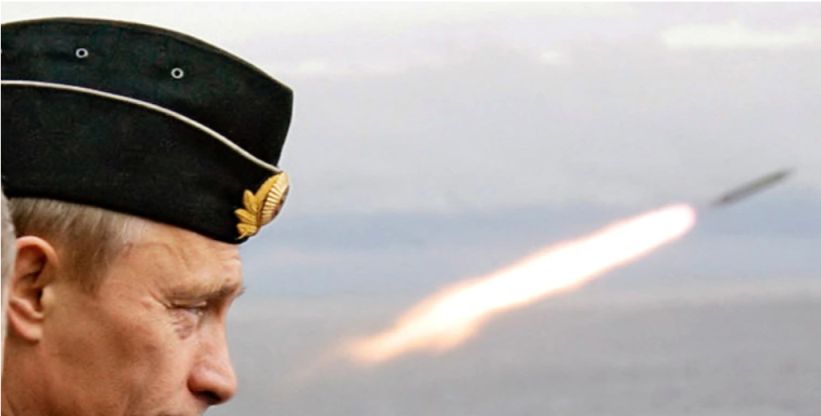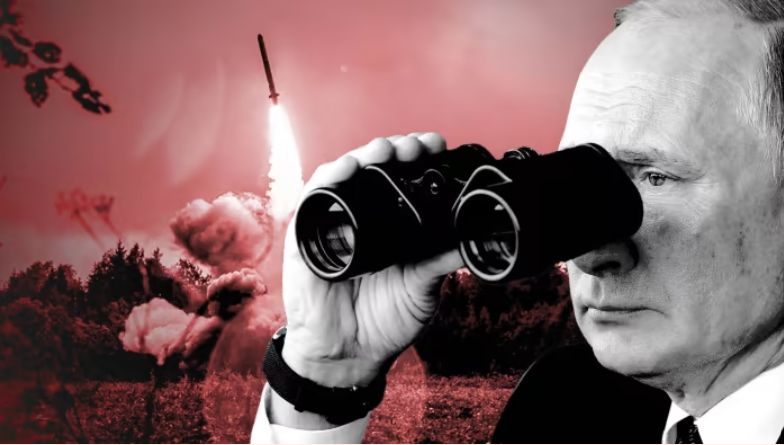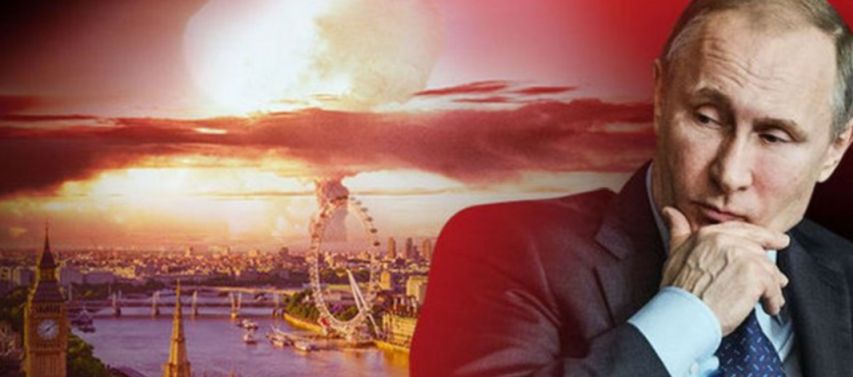By Eric Vandenbroeck
and co-workers
With Russia’s Reputation As A Great
Military Power In Tatters, Could President Vladimir Putin Resort To Nuclear
Weapons?
From the start of Russia’s
war in Ukraine, a segment of Western elite and public opinion, including politicians, experts, and commentators, has explained why the West cannot or should not
support a Ukrainian victory. When the Russian invasion began in February, the
argument was that Russian military dominance would render Western support
to Ukraine futile. Then, as the war dragged on, a claim emerged that although Moscow’s
initial plan for a lightning invasion was foiled, its forces would slowly but
surely grind their way to inevitable victory. Now, as the Ukrainian military
drives Russian forces into retreat, proponents of cutting a deal with Russia
have settled on a new narrative: that the United States and its partners need to pull back on support for Ukraine, lest
they corner Russian President Vladimir Putin and he, in
turn, decides to blow up the world.
Behind this growing
concern is the Russian military doctrine of “escalate to
de-escalate”—that if
Russia is facing the prospect of defeat due to conventional Western superiority,
it would consider using nuclear weapons to force the West to back down. Today,
Russia is losing in Ukraine. And while Moscow has threatened to go nuclear since the beginning of the
conflict, the rhetoric of Russian leaders has recently become ever more apocalyptic. Unsurprisingly, the United States, Europe, and Ukraine are increasingly concerned that Russia will
carry on its nuclear threats.
Fear, however, should
not drive the Western response to Russia’s nuclear bluster. If Putin is still a
rational actor, there are plenty of reasons why he would want to avoid atomic
use. And if he is not, the West's backing off may not make any difference.
For starters, Russian
nuclear use makes little operational sense. So-called tactical nuclear weapons
are blunt weapons with unpredictable effects. On the battlefield, the Ukrainian
military has delegated operational decision-making to lower echelons
and dispersed its forces, minimizing the size and importance
of a target that a nuclear blast could wipe out. Depending on where the strike
occurs, the fallout from the explosion could kill plenty of Russians. And given
the increasingly shambolic state of the Russian military, it is unclear
whether the Russian military could fully exploit whatever tactical advantage
Russia might gain from nuclear use. Indeed, press accounts paint Russian forces
as lacking the discipline and the kit necessary to wage a successful conventional
fight, let alone a nuclear one.

Nor is it clear that
nuclear use against a civilian target—Kyiv or another city, for example—would
break the Ukrainian will to fight. Terror bombing to lower a population’s
morale rarely works. In World War II, the German, British, and U.S. air forces
all tried and failed to break civilian morale from the air; U.S. forces tried again
in North Vietnam. If anything, these campaigns produced the opposite of their
intended effect, as populations rallied around the flag and became even more
determined to fight.
Even the analysis
around the lone previous example of nuclear use in war, the bombings of
Hiroshima and Nagasaki, is often misunderstood. True, Japan surrendered after
these attacks. This fact, however, overlooks two key points. First, Japan was
already losing the war, so atomic use sped up, rather than reversed, the
battlefield outcomes. Second, even after the nuclear strikes, the Japanese
leadership still debated whether it should fight.
Russia were it to use
its nukes, it would immediately incur a significant strategic backlash. The
United States and its allies have already promised “catastrophic
consequences” if
Russia uses nuclear weapons. While the Biden administration has not specified
in public what these consequences may be, the United States and its allies have
plenty of tools at their disposal, from economic measures—such as seizing, rather than simply freezing, Russian
assets—secondary sanctions, and even conventional strikes on Russian forces in
Ukraine. Finally, a certainly catastrophic, though admittedly unlikely, a
consequence of a Russian nuclear strike would be the United States striking
back with a nuclear response of its own.
The political
backlash Russia would face if it deployed its nuclear arms against Ukraine is
also significant. Russia’s international support, even among its friends, is
already shaky. Just last month, India’s Narendra Modi publicly scolded Russia; China has already expressed its concern, and Russia’s other
supporters—including Serbia and North Korea—have tried to distance themselves from Moscow’s
recent actions. All this is already happening now—before Russia was to cross
the still theoretical nuclear threshold.

Finally, there would
be long-term consequences to Russia’s nuclear actions. If Moscow passed its
threat, it would forever change the international security environment. Say
Russia’s gamble succeeds, the Western coalition backing Ukraine is as weak and
divided a coalition as Putin thinks it is, and the West eventually forces
Ukraine to back down. This would then likely set off a wave of nuclear
proliferation—particularly in states close to the Russian border seeking to
preserve their independence. Many of these new nuclear states would,
presumably, have their weapons trained on Russia. Again, if only to protect
their sovereignty.
By contrast, if the
gamble fails and Ukraine continues to fight with Western support, the West may
conclude that it can still fight through Russian nuclear use—albeit at horrific
costs. If this comes to pass, Putin will have undercut his sole remaining
source of leverage: the West’s fear of his nuclear arsenal. Either way, in the long run,
Russia loses.

By any rational
calculus, Russian nuclear use does not make strategic sense. But what if
Russia, particularly Putin, is not entirely rational? This is a nontrivial
possibility. After all, weighing the costs and benefits before February would
probably have concluded that an invasion of Ukraine did not make strategic
sense for Russia. Now, Putin may feel too angry or humiliated to back down. He
may genuinely believe that Russia’s destiny is to restore its empire.
Alternatively, he may fear that the domestic political consequences of backing
down outweigh the risks of nuclear escalation.
But if Putin is drawn
to nuclear use in humiliation or anger, then backing off support for Ukraine
would do little to change the current trajectory of the war. Even if the United
States were to push Ukraine to freeze the conflict, Russia would still, in all
likelihood, remain feeling humiliated and aggrieved. After all, many predicted
that this war would last mere days, yet it has dragged on for months. The Kremlin wanted to “demilitarize and de-Nazify” all of Ukraine,
not just control the territories it currently occupies. And Russia will
have suffered tens of thousands of casualties. The aura of its
military might remains shattered. Cutting a deal, therefore, is unlikely to placate
the emotional impetus for Putin’s nuclear threats. It would only give Putin and
his inner circle more time to nurse their grievances, arm up, and try again.
Giving in to Russia’s
nuclear blackmail does not solve Putin’s domestic problems, either. Even with
the war on hold or outright over, the Russian elite would remain in turmoil.
Prominent Russians have died under mysterious circumstances, while others
call for the defense minister to commit suicide and openly ridicule the
senior military ranks. Hundreds of
thousands of Russians
have fled the country. Western sanctions continue to take a bite out of the Russian economy, and the impacts
are expected to increase over time. Russia will have to
reintegrate hundreds of thousands of angry veterans, all of whom have been
desensitized to violence; some very likely committed war crimes. Even if none of these factors threaten the regime, Putin likely will need further
concessions from the West—including sanctions relief—if he wants to relieve
internal pressures. Threatening nuclear use remains one of his last sources of
leverage.
Above all, if Putin
is no longer a rational actor, as some fear, then Ukraine and its Western
supporters may have no other choice than to fight on. What, after all, is the
alternative? The glue that holds together any agreement—certainly one to end
the war—requires that both sides honor their commitments over the long term.
How does one negotiate for peace with a state that has proved itself
irrational? Any lasting settlement may, at that point, simply not be in the
cards.
Of course, the United
States and its allies should be prepared if Russia goes down the nuclear path.
But letting their nuclear apprehensions overshadow all the other interests at stake in Ukraine makes little sense. Indeed,
the only thing more terrifying than Russian nuclear use may be letting such
fears drive and derail Western and Ukrainian strategy.
For updates click hompage here